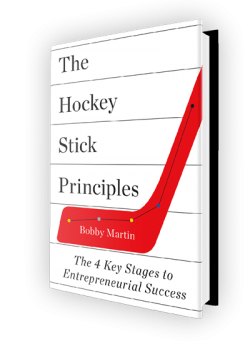This is a follow-up from last week’s post, “Doing Things Badly,” which recounts the first year of starting First Research, my first company, which was eventually sold to Dun & Bradstreet for $26.5 million.
 First Research struggled during that first year. On paper, it was failing. Year-end 1999 revenue was just shy of $4,000. We had $399 in cash, $899 in accounts receivable, and a $20,150 loan payable to me. So even nine months into the venture, we had almost nothing to show for it. I was approaching that crossroads many people experience after a year of starting a new business: Should I keep going with First Research? Since I was unable to answer that question, I kept fighting with no stopping-point in mind. The six reasons I kept on were as much psychological as they were empirical.
First Research struggled during that first year. On paper, it was failing. Year-end 1999 revenue was just shy of $4,000. We had $399 in cash, $899 in accounts receivable, and a $20,150 loan payable to me. So even nine months into the venture, we had almost nothing to show for it. I was approaching that crossroads many people experience after a year of starting a new business: Should I keep going with First Research? Since I was unable to answer that question, I kept fighting with no stopping-point in mind. The six reasons I kept on were as much psychological as they were empirical.
First, First Research was about so much more than a business – it was a crutch to buoy my emotions after three crushing failures: My long-time girlfriend had just dumped me; before starting my business, I had been passed over for a bank manager job; and I found myself sitting on the bench while playing soccer for a local semi-professional team. In a frustrated state of near wall-to-wall failure, I wasn’t interested in failing again. And I was not a rational investor–a $500 check made me feel rich. Thus, my desire to keep First Research going was more emotional than logical.
Second – I was motivated by a “me-against-the-world” mentality. I enjoyed playing the underdog because it confirmed my belief that I wasn’t supposed to be successful; therefore, I had nothing to lose. So why not give it everything I had? Managers holding me accountable or requiring that I do something had hardly motivated me. Instead, I was motivated by my own “inner manager” daring me: “This is a big challenge, Bobby; can you figure it out?”
Third – I loved trying to make something work that had never been done before. Somewhere in my DNA is the microchip, “Wants to build new concepts.” When I woke up every morning, creating something gave me a sense of wonder. My cofounder, Ingo Winzer, later told me, “After a year, we still didn’t know if we had a business. That didn’t matter to me. By then I was pretty confident something good would happen, mainly because you were so excited about what we were doing. I think every new business needs that–infectious enthusiasm. Just having a good idea isn’t enough.”
Fourth – my sixth-sense confidence told me that my idea was a good one. Common sense told me that a salesperson needed to understand a customer’s business before a meeting. Almost every sales guru in the country was preaching sales-call preparation and understanding the customer’s business. And from my own first-hand experience as a banker, I was confident that First Research was an effective new tool. I only needed patience and execution to convince others.
Fifth – I wanted to finish the puzzle. Parts of the puzzle, like product enhancements and reaching new customers, were yet to be pieced together. You can’t start a puzzle and not finish it. Putting its pieces together was fun and absorbing. Every time Ingo and I matched a puzzle piece, we created that wonderful feeling of accomplishment for ourselves.
And last – Ingo and I never defined failure. For example, we never decided that $4,000 in sales during the first year was an indication of how we had performed. We never talked about when or why we would quit because it wasn’t an option. We felt successful because we were in the game.
So Ingo and I just buckled down and did our thing. I woke every day and asked myself, “How can I convince someone to buy our amazing product?” And Ingo woke up every day and asked himself, “How can I write an industry profile that will blow the socks off our customers?” And that became our fight: it was simple, precise, restricted in scope, energetic, and elegant.
Not taking outside investors enabled Ingo and me to have this simple mentality. An outside investor would have likely become impatient and frustrated by our inability to meet our business plan goals. Spending only the money we needed to get the product going kept us focused. Without investors, Ingo and I didn’t need to continuously satisfy someone else or waste our time explaining our failures—we simply recalibrated and fixed the mistakes. My lack of business experience was never a question because we were stuck with me—no hiring/firing quandaries there!
And so the fight went on.
Sign up to get more great insights directly to your inbox.
As a special bonus, you'll also immediately get access to my inside analysis of what made 172 diverse companies achieve take-off revenue growth.
